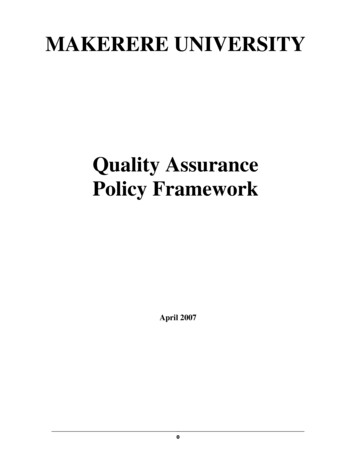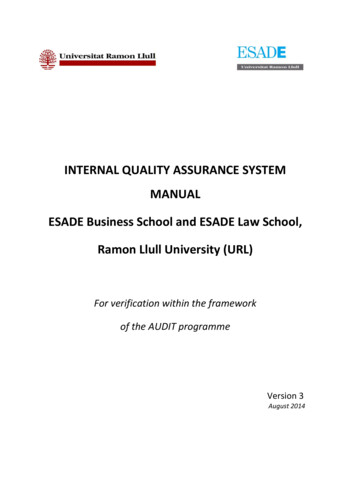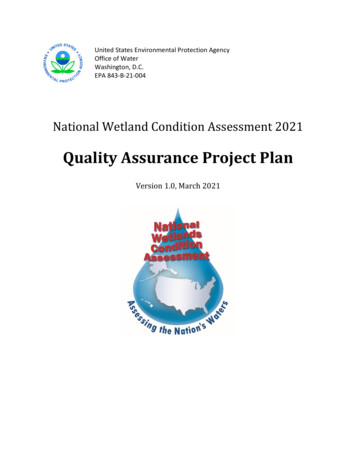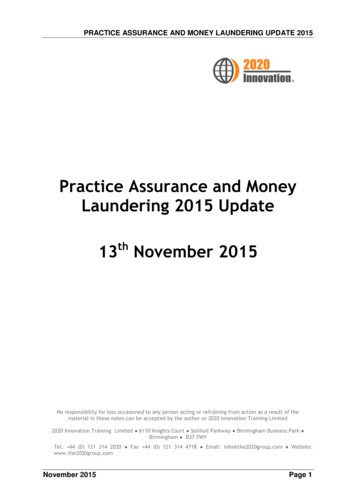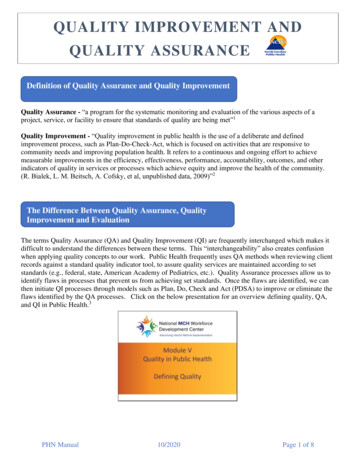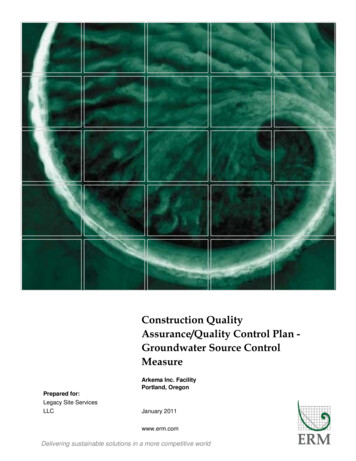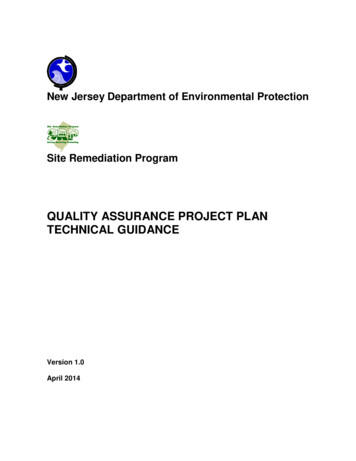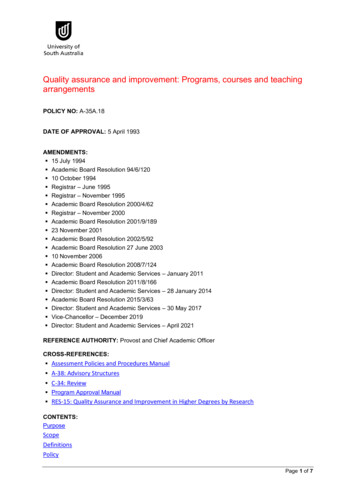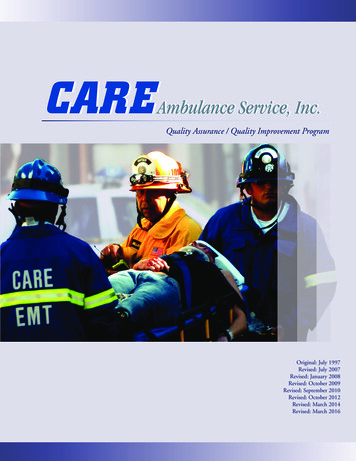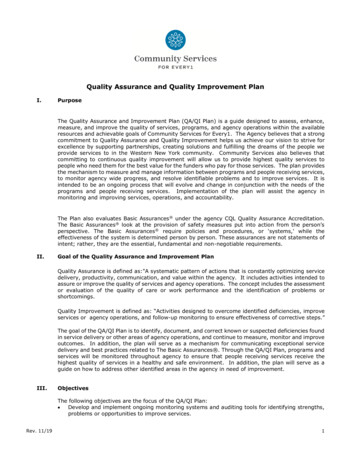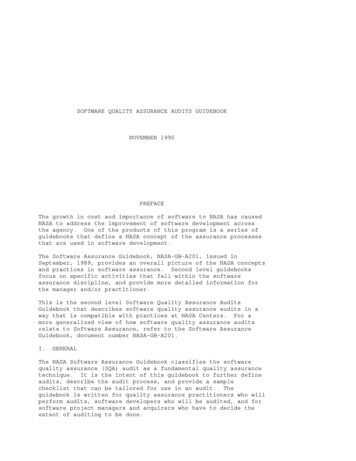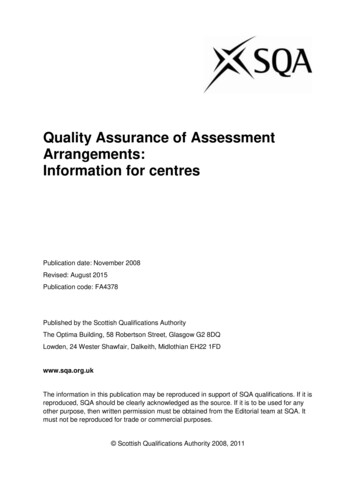
Transcription
Quality Assurance of AssessmentArrangements:Information for centresPublication date: November 2008Revised: August 2015Publication code: FA4378Published by the Scottish Qualifications AuthorityThe Optima Building, 58 Robertson Street, Glasgow G2 8DQLowden, 24 Wester Shawfair, Dalkeith, Midlothian EH22 1FDwww.sqa.org.ukThe information in this publication may be reproduced in support of SQA qualifications. If it isreproduced, SQA should be clearly acknowledged as the source. If it is to be used for anyother purpose, then written permission must be obtained from the Editorial team at SQA. Itmust not be reproduced for trade or commercial purposes. Scottish Qualifications Authority 2008, 2011
For an up-to-date list of prices visit the Publication Sales and Downloads section ofSQA’s website.This document will be produced in alternative formats, including large type, Braille andcommunity languages. For further details telephone SQA’s Customer Contact Centre on0345 279 1000.SQA is committed to using plain English. We will try to make our publications as easy andstraightforward to understand as we can, and will try to avoid all unnecessary jargon. If thereis any language in this document that you feel is hard to understand, or could be improved,please write to Editor, Communications team, at the Glasgow address above or e-mail:editor@sqa.org.uk.
ContentsOverview of quality assurance of assessment arrangement in centresIdentify the candidate’s assessment needDetermine the most appropriate assessment arrangementVerify the candidate’s need for an assessment arrangementAuthorise the request for assessment arrangements11122Quality assurance by SQAEvidence to support the provision of assessment arrangementsQuality assurance of assessment arrangements checklist335Additional guidance for schoolsSection 1A: Evidence required for all candidatesSection 1B: Evidence required for specific assessment arrangements7812Additional guidance for collegesSection 2A: Evidence required for all candidatesSection 2B: Evidence required for specific assessment arrangements161721Appendix 1: Suggested checklist for internal verification process24Appendix 2: Commonly asked questions25
Overview of quality assurance of assessmentarrangement in centresTo ensure that suitable assessment arrangements are provided on behalf ofthose candidates whose assessment needs have been appropriately identified,your centre must have an effective internal quality assurance system foridentifying and verifying candidates’ assessment needs.Your centre’s quality assurance system should include processes to: identify a candidate’s assessment needdetermine the most appropriate assessment arrangementverify the candidate’s need for the assessment arrangementauthorise the submission of a request for an assessment arrangement in anexternal assessmentAt all stages, professional dialogue is essential between teaching staff, learningsupport staff, those responsible for quality assurance and those responsible forsubmitting requests for assessment arrangements to SQA. In some cases, otherkey professionals, such as therapists, specialist teachers or educationalpsychologists, may also be involved.However, in all cases, school and college SQA Co-ordinators should work closelywith staff in learning support to ensure they are aware of the assessmentarrangements that may be required for candidates.Identify the candidate’s assessment needWherever possible, a candidate’s likely difficulties in accessing the Unit or Courseassessment should be identified before he or she embarks on the Unit or Course.In some cases, however, the candidate’s difficulties may only become apparent,or be disclosed, during the candidate’s course of study. The need for assessmentsupport could be identified by the candidate, by support for learning staff, or bythe subject teacher or lecturer.Determine the most appropriate assessment arrangementThis is the stage in your internal quality assurance system where you determinewhat assessment arrangements will be required. This could be quitestraightforward (for example, the provision of a commonly requested assessmentarrangement in the external assessment in a National Course) or it could requiredetailed discussion with SQA (for example, where the competence standard in avocational qualification could be invalidated by the proposed assessmentarrangement).The specification for each Unit and Course lists the evidence that is needed toshow that the Outcomes and assessment/competence standards have been1
achieved. For example, candidates may be required to show that they haveknowledge, practical skills, or the ability to work in a particular way.The specification will also set out the assessment conditions and the evidencerequirements. If your candidate is able to achieve the Outcomes andassessment/competence standards, but is unable to do so using the suggestedassessment activities outlined in the specification, there is often scope to proposealternative ways of generating the necessary evidence.Assessment evidence can be drawn from a variety of activities and presented ina variety of formats. Assessors should use their professional judgement, subjectknowledge, and understanding of the candidate’s additional support needs (inconsultation with support for learning staff) to determine the most appropriateways to generate evidence and the conditions and contexts in which they areused.Verify the candidate’s need for an assessment arrangementThis is a key stage in your internal quality assurance system. Documentedevidence of your verification process, and the personnel involved, must beavailable to SQA. Verifying the candidate’s assessment needs is extremelyimportant for two reasons: You need to be assured that your decision to provide, or not to provide, aparticular assessment arrangement can be justified, and that it accords withboth SQA guidance and relevant equality legislation. We need to ensure that centres have in place their own robust internalverification process which ensures that all relevant information and evidencehas been gathered and considered in determining the provision ofassessment arrangements for a candidate in any internal or externalassessment.Appendix 1 provides a suggested checklist of evidence to support the provisionof an assessment arrangement.Authorise the request for assessment arrangementsThe Head of Centre, or a member of senior management, is responsible forauthorising any request to SQA for an assessment arrangement in the externalassessment by the published deadline date.In submitting a request for an assessment arrangement in an externalassessment, your centre is acknowledging that it has met its responsibilities interms of quality assuring the appropriateness of the request, and is confirmingthat it has the obtained the written consent of the candidate to share their dataand submit the request.2
In providing an assessment arrangement in an internal assessment, your centreis acknowledging that it has met its responsibilities in terms of quality assuringthe appropriateness of the provision.Quality assurance by SQAEvery year, from September to December, SQA’s Quality EnhancementManagers visit and monitor a sample of centres to ensure that there are effectiveinternal quality assurance systems in place for the provision of assessmentarrangements for candidates in both internal and external assessments.If your centre is selected for an audit visit, you will receive feedback and advicefrom the Quality Enhancement Manager and, providing he/she is satisfied withyour system, assessment arrangements can be provided as normal. Appendix 2provides more information on the audit visit.If the Quality Enhancement Manager is not satisfied that your centre’s systemand/or available evidence meet our requirements, you will receive furtherguidance and advice. A follow-up visit will be organised after which, providingyour systems and evidence now meet our requirements, assessmentarrangements can be provided as normal.In the unlikely event that, after the second visit, your centre still does not meetour requirements, we will ask you to submit the documented evidence for all yourcandidates for whom assessment arrangements are being proposed. We willconsider the supporting evidence and make a decision on a case-by-case basis.Note: Appeals against decisions involving assessment arrangements are coveredin our general guidance on appeals, The Appeals Process: Information forcentres (publication code: FF5480, April 2015).Evidence to support the provision of assessmentarrangementsThe Quality Enhancement Manager’s audit visit is based around seven key typesof documented evidence:1Evidence of your centre’s internal verification meetingsYou should have documented evidence of the meetings/discussions at whichrelevant candidate information and evidence was considered before theprovision of an assessment arrangement in an internal assessment and/orthe request to SQA for an assessment arrangement in an externalassessment. This might be the minutes or agreed notes from the verificationmeeting(s). They must be signed and dated.2Evidence that your candidates have agreed to the provision ofassessment arrangements and to their details being disclosed to SQAYou should have confirmation from candidates that they have been involvedin discussions about, and have agreed to, the assessment arrangements3
being provided, and that they intend to use them. You must also obtainconsent from candidates for relevant details of their disability/additionalsupport needs to be disclosed to SQA. For some candidates, you may wish toinvolve parents/carers in this discussion.3Evidence of your candidates’ disabilities/additional support needs andhow this affects them in the learning and teaching situationIn all cases, there should be documented evidence of the nature and extentof the candidate’s disability or difficulty, and how it has impacted on teachingand learning in the classroom.Information, where relevant, from professionals (for example, therapists,specialist sensory impairment teachers, subject teachers and educationalpsychologists) may also be available. The evidence might include a workingfile containing information about the candidate’s disability and/or additionalsupport needs, including for example: reports, assessments, minutes ofmeetings, notes of case conferences, ongoing consultations on the currentteaching support and assessment arrangements used.4Evidence of their need for current assessment support, how this is met,and how it relates to the arrangements being requested or providedMost candidates requiring assessment arrangements will need ongoingsupport to ensure they are not disadvantaged during their course. Thereshould be documented evidence that links this support to the assessmentarrangements needed for the assessment.5Evidence that varying needs across subjects have been taken intoaccountAs needs may vary across subjects, there should be documented evidencethat the need for assessment arrangements has been considered on asubject-by-subject basis.6Evidence for specific types of assessment arrangementsFor some types of assessment arrangements, there should be additionaldocumented information/evidence of the need for the particular arrangement.For example, if a scribe is being provided, this evidence might include: speed,accuracy and legibility assessments by the specialist teacher/lecturer;spelling assessments; speed (wpm) for production of free, dictated, or wordprocessed work; some samples of work produced with and without a scribe.7Evidence of a system for the management of SQA assessmentarrangements which is supported by senior managementYou should have documented evidence of a whole-school/whole-collegeapproach to assessment arrangements, for example, as part of widerinclusive practices/policy, etc.The following checklist, based around these seven types of evidence, is designedto help prompt you to find out if you have the appropriate evidence for the auditvisit.4
Quality assurance of assessment arrangements checklistReferenceKey questions( )1 Documented evidenceof the internalverification meeting(s)1Do you hold a formal verification meeting or meetings to ensure thatall relevant information and evidence has been gathered andconsidered in determining the provision of assessment arrangementsfor candidates in both internal and external assessments?Do you have a formal minute/note of the meeting(s) that has beensigned and dated?Is it clear which assessments your verification meeting(s) is for?Are the meetings held at an appropriate time in the year?Are appropriate personnel present?Are requests for or the provision of assessment arrangementsformally authorised by a senior member of staff?Is this senior member of staff independent of the learning supportstructure in the centre?Do you have a procedure for making late decisions?2 Documented evidenceof confirmation from thecandidate that they haveagreed (i) to theprovision of assessmentarrangements and (ii) forrelevant details of theirdisability/difficulty to bedisclosed to SQAIf your candidate is under 16, does an appropriate adult (eg parent,carer, etc) countersign for them?3 Documented evidenceof the candidate’sdisability/additionalsupport needs and howthis generally affects thelearning and teachingsituationHave you the relevant information/evidence of the nature and extentof the disability or difficulty?Have your candidates signed in all cases?Is it clear which assessments this agreement refers to?Do you have a record of any candidate refusals of assessmentarrangements?Have you evidence how the disability/difficulty has impacted onteaching and learning in the classroom and that subject staff areinvolved?Is your evidence current?1 The verification meeting is the key stage in your internal quality assurance procedures. You need to be confidentthat your decisions to provide, or not to provide, an assessment arrangement in both internal and externalassessments are in line with both SQA guidance and the relevant equality legislation. This is why having a seniormember of staff who is independent of the support-for-learning process in your centre is so important; it adds rigour tothe process.5
ReferenceKey questions( )4 Documented evidenceof need for currentsupport, how this is met,and how it relates to thearrangements requestedDoes your evidence show that decisions are made on the actualassessment arrangement proposed and based on the supportprovided?Have you evidence that subject staff are involved?Have you evidence to show that the assessment arrangementremoves the disadvantage? For example, candidate workwith/without support.Is your evidence current?5 Documented evidencethat varying needsacross subjects havebeen taken into accountHave you evidence available for each subject?Have you evidence that subject staff have been involved in gatheringevidence?Have you evidence that subject staff support the arrangementproposed?6 Documented evidencefor particularassessmentarrangementsIs there specific evidence of how a particular assessmentarrangement has been determined (for example, amount of extratime needed)?7 Documented evidenceof a system for themanagement of SQAassessmentarrangements which issupported by seniormanagementIs there evidence that there is a whole school/college policy inrelation to the provision of assessment arrangements?6
Additional guidance for schoolsThe following additional information is intended for guidance only. It gives examples ofdifferent types of evidence that can support the provision of an assessment arrangement.Section 1A refers to evidence required for all candidates.Section 1B refers to the additional evidence required to support specific assessmentarrangements.7
Section 1A: Evidence required for all candidates1Evidence requirementRationaleSuggested form of evidenceNotesDocumented evidence of the internalverification meeting(s).Schools should have in place their owninternal verification system whichensures that the information/evidence isavailable to support the provision ofassessment arrangements in bothinternal and external assessments.Minutes or notes of the verificationmeeting(s): dated and signed.Membership of the verification meetingwill vary according to schools and LocalAuthorities. It should involve someoneactively involved in the support processand someone who is responsible forquality assurance It could, for example,involve the Principal Teacher of LearningSupport, the local authority educationalpsychologist, and the SQA coordinatorand/or a member of the seniormanagement team in the school.Names and position of personnelinvolved.An essential part of this process is theinternal verification meeting or meetings,where all available evidence andinformation gathered is fully consideredby relevant staff prior to submitting arequest to SQA for assessmentarrangements or providing assessmentarrangements in an internalassessment. SQA’s QualityEnhancement Manager will follow asimilar process when visiting schools.2Documented evidence ofconfirmation from the candidate thatthey have agreed (i) to thearrangements and are intending touse them and (ii) for relevant detailsof their disability/difficulty to bedisclosed to SQA.It is important that candidates (andparents/carers or guardians whererelevant) are fully involved and haveagreed to the arrangements. It is alsoimportant that candidates have agreedto information about their disabilityand/or difficulty being passed on toSQA.Pro forma or statement signed by thecandidate and countersigned by aparent/carer where appropriate.Schools may wish to involveparents/carers where appropriate.Schools may also wish to record detailsof any candidate who does not wish touse suggested assessmentarrangements.8
3Documented evidence of candidate’sdisability/additional support needsand how this generally affects thecandidate in the learning andteaching situation.In order to determine the need for anassessment arrangement, the natureand degree of the difficulty will need tohave been assessed together with theimpact on learning and teaching and onand assessment.Candidate files containing all relevantinformation such as psychological andother assessments, individual learningplans, support plans and records. Forexample, planning documentation suchas Personal Learning Plans (PLPs)and Individualised EducationalProgrammes (IEPs).In schools the information may start inprimary and be comprehensive.4Documented evidence of need forcurrent support, how it is met andhow it relates to any arrangementsrequested.Most candidates requiring assessmentarrangements will need on-goingsupport on a regular basis to ensurethey are not disadvantaged during theircourse. This support should link to thearrangement needed for theassessment.Plan and record of support fromSupport for Learning staff in classand/or in support base and/or details ofsupport regularly required from subjectteachers in class.The following are key elements of theevidence required to support the provisionof assessment arrangements.Documented evidence that varyingneeds across subjects have beentaken into account.As needs may vary across subjects, theneed for assessment arrangementsshould be considered on a subject-bysubject basis.Evidence of consultation andnegotiation with subject staff whichtakes into account the range ofdifferent subject assessment standardsand evidence requirements.Documented evidence for particulararrangements.The particular arrangement shouldmatch the candidate’s individual needs.Evidence of need for a particulararrangement.56How has the candidate been supportedduring the course?(See Section B)7Documented evidence of a system forthe management of SQA assessmentarrangements which is supported bysenior management.They answer the questions:Have you considered the varyingassessment standards and evidencerequirements of different subjects?Have you evidence that the assessmentarrangement requested is appropriate?(See Section B)Schools should have in place a wholeschool approach to assessmentarrangements as part of each school’swider inclusive practices/policy etc.There should be policy documentationand guidance for all staff in relation tothe provision of assessmentarrangements? The policy shouldoutline the roles and responsibilities ofrelevant staff.9In almost all secondary schools, planningto meet identified assessment needs is acollaborative process between the classteacher and the support for learningteacher but process should also involve asenior manager.
Examples of good practice for evidence requirementsEvidence of the internal verification meeting(s)In St Barnabas’s High School the internal verification meeting is held in November eachyear. It is chaired by the local authority psychologist. The Principal Teacher (Support forLearning) and the SQA Co-ordinator are also present. Relevant information/evidenceavailable for each candidate requiring assessment arrangements is fully consideredagainst the guidance from SQA using the SQA checklist (see Appendix 1).Only assessment arrangements for those candidates whose evidence is complete areverified. Where evidence is unclear or incomplete, decisions are made as to whether it ispossible to reasonably produce the evidence, whether the provision of the assessmentarrangement is appropriate, or if there is a need to contact SQA for further guidance.Minutes of the meeting are taken, noting those present and the decisions taken. Theminutes are dated and signed by the SQA Co-ordinator.The Local Authority Psychological Services also takes responsibility for trying to achieve aconsistent approach to the provision of assessment arrangements across the Authority. Itdoes this by monitoring the provision of assessment arrangements and suggestingcommon approaches and processes.Evidence of confirmation from the candidate that they have agreed to theassessment arrangements and are intending to use themIn Castle Semple High School, the Support for Learning Department devised a pro formafor each candidate which summarises the assessment arrangements to be put in place forboth internal and external assessments in each subject.The pro-form also explains that relevant information about the candidate’s difficulties maybe passed on to SQA. This is fully discussed with each candidate. All candidates areencouraged to discuss the arrangements with their parents or carers before signing. Forcandidates under 16, a parent or carer is also asked to sign.Subject teachers also use parent evenings as an opportunity to discuss withparents/carers the assessment arrangements required for the candidate in their particularsubject.Evidence of disability/additional support needs and how this generally affects thelearning and teaching situationCraignure High School keeps relevant information on candidates in two main places. Apupil file contains general information, including details transferred from primary school,medical records, educational psychologist reports, Personalised Learning Plans (PLPs)and Individualised Educational Programmes (IEPs) etc. The Support for Learningdepartment also has its own files containing current evidence including details ofassessment of need, records of support given etc. Together these files give details of the10
difficulty each candidate has experienced and how it affects the candidate’s learning andteaching.Evidence of need for current support, how it is met and how it relates to thearrangements requestedIn Dundee Grammar School, the Support for Learning department keeps detailed recordsof those pupils who are currently receiving additional learning support. This also includesrelevant information from subject teachers about support needed and provided in class.In one pupil’s case, the file indicates that he has scribing support from an auxiliary forsome of his subjects (National 4 Modern Studies and National 4 RMPS). He also attendsthe support base for one hour a week to finish off work he cannot complete in otherclasses. Subject teachers also record that they have needed to act as a scribe for thispupil on occasion.Evidence that varying needs across subjects have been taken into accountIn Lammermuir High School the detailed records kept in the Learning support base showthat, for one candidate with specific learning difficulties, all subject teachers have beenconsulted. Teachers in subjects where extensive writing is required (for example, in theclass assessments for Higher History, and Higher Modern Studies) confirm that thecandidate has access to a computer with spellcheck software in class. In Maths andPhysics, however, it is felt that the candidate is able to hand write his own responses andprefers to do so.Evidence of a system for the management of SQA assessment arrangements whichis supported by senior management.In St Joan’s High School, there is policy documentation and guidance which provides allstaff with relevant information on the school’s approach to providing appropriate evidencefor assessment arrangements. This highlights the need for partnership working across theschool and clarifies roles and responsibilities of subject and learning support staff.11
Section 1B: Evidence required for specific assessmentarrangementsFor some candidates, the evidence for their need for a particular assessment will be wellestablished and recorded in the evidence base outlined in Section 1A — for example, for avisually impaired candidate using braille, a deaf candidate using BSL, a candidate with aspecific learning difficulty using ICT, a candidate with an autistic spectrum condition using aprompter, or a severely physically disabled candidate using assistive technology.This section refers to the additional evidence required to support specific assessmentarrangements.ArrangementSuggested forms of evidenceUse of computer/human readerSchools should have clear evidence that a reader isneeded.There should be documented evidence that acandidate has difficulty with accessing written text.Recent test of reading speed andaccuracy.Reading comprehension test.Evidence from dyslexia screeningpackages.Evidence of class work completedwith and without the use of acomputer/human reader.On-going use of acomputer/human reader forsupport in class noted in supportrecords.Use of scribe/voice recognition softwareSchools should have clear evidence that a scribe/voice recognition software is needed.There should be documented evidence that acandidate has significant difficulty with writing.For candidates who are unable to produce anywritten work at all, written confirmation of this from aspecialist teacher will be acceptable.Speed, accuracy and legibilityassessment by specialist teacher(which might include spellingassessment, speed of productionof free, dictated, or wordprocessed work).Example of class work producedwith and without scribe/voicerecognition software.Ongoing use of scribe/voicerecognition software for support inclass noted in support records.Transcription with correctionSchools should have clear evidence thattranscription is needed. This arrangement isdesigned to meet the needs of candidates who havesubstantial difficulties with written communicationbut who are unable to use appropriate ICT.Same types of evidence as above.Extra timeIf extra time is required for other assessmentarrangements — for example, candidates usingscribes, readers, signing — no additional evidence isrequired.Samples of work which indicate adifference in candidate’sperformance given extra time.Evidence of the need for subjectteachers to allocate extra time forassignments and assessments and12
When extra time is the only assessmentarrangement required there should be evidence ofan ongoing significant difficulty in completing tasks(class tasks, assignments, assessments) in normalallocated time.It is not expected that schools will have absolutevalues for the extra time needed. It is important,however, that evidence is available to show that theextra time being provided is reasonable and reflects,on average, the candidate’s needs.NB Evidence that extra time is used when given, forexample in a timed assessment, is not sufficientevidence on its own of the need for additional time.13that this extra time has been usedon an on-going basis.Evidence that the amount of extratime requested is reasonable andappropriate.
Examples of good practice for evidence required for specific assessmentarrangementsUse of a computer/human readerIn St Barnabas’s School, a number of candidates have difficulty with reading. In addition torecording the evidence detailed in Section A, the Support for Learning staff also assessreading speed and accuracy regularly, and maintain records of when a computer/humanreader is used in class and in assessments.One pupil has had reading difficulties since primary school. On a yearly basis, supportstaff have tested his reading and although there have been improvements which enablehim to cope with some tasks independently, testing shows that he still has difficulty withreading and comprehension. This information is retained on file and his support planshows that he has access to text to speech software in English and History. Notes fromother subject teachers show that he uses text to speech software, on occasion, to helphim with reading in class. The Support for Learning department records this informationand ensures that he has access to text to speech software for all class tests and he has aregular time in the support base where he can be helped to complete assignments andhomework.Transcription with correctionIn Castle Semple High School there is one pupil who has a well-documented writingdifficulty — samples of writing are available on file. Her writing is extremely untidy andgets very hard to decipher when she is under any time pressure, especially in timedassessments. As she gets more nervous and anxious, she stammers and this makesusi
www.sqa.org.uk The information in this publication may be reproduced in support of SQA qualifications. If it is . The Quality Enhancement Manager's audit visit is based around seven key types of documented evidence: 1 Evidence of your centre's internal verification meetings
